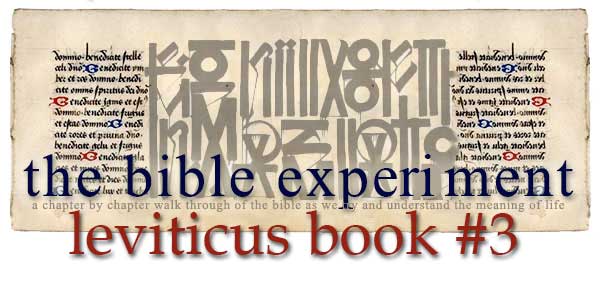Just as a quick recap and reminder – I have started going through every book of the Bible, one by one and so far we have made it to Leviticus – the third book of the Bible. I am reading the books, and writing an overview of the book as well as grappling with the sticky bits of each book in turn. If you’d like to follow along from the beginning you can do so here.
 The Bible Experiment Leviticus
The Bible Experiment Leviticus
Summary: In Exodus, towards the end of the book, God gave the instructions for building the tabernacle. And in Leviticus God gives the rules and guidelines for how to worship in the tabernacle. Just to save you the pain and the agony of reading the book for yourself I’ve broken out the major topics of the book here:
Chpt 1-7 The Five Main Offerings
Chpt 8-10 Aaron and Sons setup as Priests
Chpt 11-15 Clean and Unclean Definitions
Chpt 16 The Annual Day of Atonement
Chpt 17-26 Definition of Holy Living
Chpt 27 Regulations on offerings vowed to God
As I said, for me personally, I have a real hard time reading about the types of discharges a human can have that will lead to the individual becoming unclean. Especially seeing as though the New Testament has seemed to make many of these details irrelevant. I mean, if it isn’t the New Testament making them irrelevant then modernity. Wow, that’s slippery that steep slope I just walked out on. I’m not implying that the Bible is only relevant if it is historically applicable. Anything but. Here, why don’t we walk through a couple verses from the Old Testament, and then we’ll pull out a few counterpoint examples from the New Testament to show what I mean.
Leviticus 11:4-7 “Nevertheless, you are not to eat of these, among those which chew the cud, or among those which divide the hoof: the camel, for though it chews cud, it does not divide the hoof, it is unclean to you. Likewise, the shaphan, for though it chews cud, it does not divide the hoof, it is unclean to you; the rabbit also, for though it chews cud, it does not divide the hoof, it is unclean to you; 7and the pig, for though it divides the hoof, thus making a split hoof, it does not chew cud, it is unclean to you.”
Isaiah 66:17 “Those who sanctify and purify themselves to go into the gardens, following one in the midst, eating pig’s flesh and the abomination and mice, shall come to an end together, declares the Lord.”
And now let’s take a peek at the New Testament, and what Christ said specifically about “unclean” foods:
Mark 7:15-20 “There is nothing outside a person that by going into him can defile him, but the things that come out of a person are what defile him.” And when he had entered the house and left the people, his disciples asked him about the parable. And he said to them, “Then are you also without understanding? Do you not see that whatever goes into a person from outside cannot defile him, since it enters not his heart but his stomach, and is expelled?” (Thus he declared all foods clean.)”
Romans 14:14 “I know and am persuaded in the Lord Jesus that nothing is unclean in itself, but it is unclean for anyone who thinks it unclean.”
We see pretty quickly that the Old Testament Law stipulating what was to be eaten and not eaten got completely tossed out. Then why exactly were the Israelites told what to eat and not to eat then? The answer here is blindingly obvious and extremely boring. I would assume that these rules and guidelines were there to protect the people ultimately. Living in a desert 5,000 years ago they had a fairly simple problem on their hands. Right? Pork + Heat = all kinds of badness I would assume.
So the contextualization of Leviticus (5,000 years ago, for a nomadic desert dwelling people) makes it completely irrelevant to me, right? No no no – now slow down there Hoss. Not so fast. A lot of these rules and stipulations throughout Leviticus were tossed out in the eating category. But just as many were upheld and supported throughout the New Testament. But I’ll get to some of those in a few minutes.
Another topic covered throughout Leviticus that isn’t as relevant would be the topic of sacrifices. For now I was just trying to explain why a reading of Leviticus (as well as Numbers & Deuteronomy for that matter) is difficult seeing as though Christ has turned this particular area of this religious experience of our relationship with Him upside down.
But for giggles, I just swagged a percentage of relevancy for the book of Leviticus. And I very quickly ground to a halt. Because I realized that technically speaking 100% of Leviticus has been overridden by the New Testament and grace. Right? The sacrifices? Done. The priestly duties? Done. Definition of what to eat, not eat? Done. Clarification of cleanliness and uncleanness? Done. About the only section that stands today is Leviticus 20 and I’ll get to that later. But at the end of the day, through the vantage of the New Testament we are looking at a book that has been superseded.
Hot Leviticus Topics:
Why did God strike Aaron’s sons dead? I mean, both of them even. The children of Israel pull out the golden calf while Moses is getting the Ten Commandments. And then God establishes the Levites as the priests who were to govern the people spiritually and guide them into God’s presence regularly. Moses sets up Aaron as the chief priest and his two sons. They receive guidance on how to offer sacrifice. And then, the first time (that is mentioned anyway) that the sons offer sacrifice the are struck down by God. Eh? Did they bow four times and not five? Was the fat of the offering not fatty enough?
I think we have been given a good clue here in Leviticus 10: “Now Nadab and Abihu, the sons of Aaron, took their respective firepans, and after putting fire in them, placed incense on it and offered strange firebefore the Lord, which He had not commanded them. And fire came out from the presence of the Lord and consumed them, and they died before the Lord.” (Emphasis mine). But, so they lit their fire pans. And? Here, you need this scripture too from Leviticus 9:24 “Then fire came out from before the Lord and consumed the burnt offering and the portions of fat on the altar; and when all the people saw it, they shouted and fell on their faces.” So apparently, God preferred to light the sacrifice himself. So much so that God referred to it as “their strange fire”. But why would they even try to light their own fires unless they were proving who was in control? Could it be that their hearts were hellbent on making a point? If so, they made it… and so did God.
What’s with the unnatural sexual relations section? In Leviticus 20 it is a bullet point list of what is unacceptable. One right after the other. Sex with brothers, sisters, parents of spouses, animals, and on and on. The one society today really digs into is the Leviticus 20:13 to the exclusion of every other item on the list. “If there is a man who lies with a male as those who lie with a woman, both of them have committed a detestable act.” If I were gay, I get it… that would be a problem for me. Right? This “God” of the universe finds what I do as “detestable”? But He also finds all manner of sex outside of marriage as detestable as well. If 5% of all men are gay (not trying to pick a fight with that number, just quoting this article here.) then I get that 5% would be a bit offended by this. But how many people are having or have had affairs? Or having any sort of sex outside of having it with their spouse? This particular article says that of American marriages, somewhere around 15-18% have had an affair at some point. Doing a little bit of math… based on these nebulous numbers:
There are currently 313 million people in America now.
5% are gay – means 15,565,000
16.5% have had affairs – means 51,645,000
Basically that means somewhere around 67,210,000 people should be put to death if these Laws were still enacted or relevant today. Right? And that doesn’t even count the number of people into sex with animals. Or single people having sex outside of marriage. That percentage is going to go even higher from our current 67 million number. But what is the point of these regulations, and the definition of all this guilt? Luckily the Bible (Paul specifically) comments on this issue:
Romans 7:7-13 “What shall we say then? Is the Law sin? May it never be! On the contrary, I would not have come to know sin except through the Law; for I would not have known about coveting if the Law had not said, “You shall not covet.” 8But sin, taking opportunity through the commandment, produced in me coveting of every kind; for apart from the Law sin is dead. I was once alive apart from the Law; but when the commandment came, sin became alive and I died; and this commandment, which was to result in life, proved to result in death for me; for sin, taking an opportunity through the commandment, deceived me and through it killed me. 12So then, the Law is holy, and the commandment is holy and righteous and good. Therefore did that which is good become a cause of death for me? May it never be! Rather it was sin, in order that it might be shown to be sin by effecting my death through that which is good, so that through the commandment sin would become utterly sinful.”
So um, what the heck does that mean? Basically Paul is saying that without the Law I wouldn’t understand my complete and utter need for a savior. I wouldn’t need the real distance between me and a perfect God. So I would argue, the issue isn’t homosexuality. Or infidelity. Or covetousness. Or lying. Or stealing. Or any of these things… but all of them. EVERYONE is guilty under the law. Everyone. Everyone is in desperate need of God’s saving grace that came to us as result of Christ’s death and resurrection. But in the days of Leviticus they had a temporary resolution for this and that was the sacrifices the priests did on the people’s behalf. And that is the world these people are dealing with. They now understand their need, and the solution to their need.
But today, we like to get hung up on the one thing that seems controversial to us as opposed to realizing we are all dead in our sin. That we all are in desperate need of being saved.


 The Bible Experiment Leviticus
The Bible Experiment Leviticus